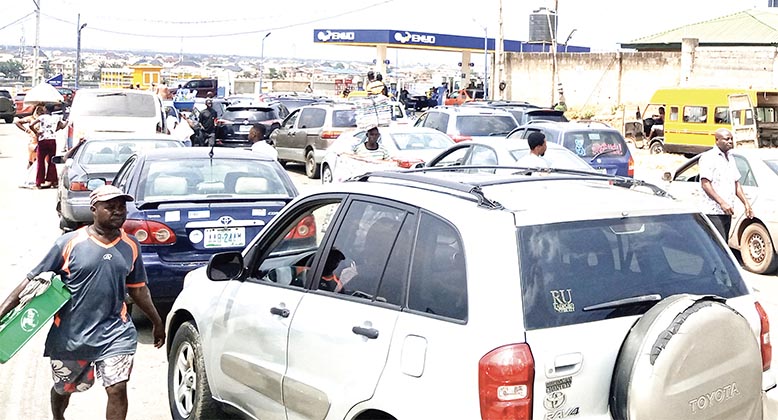
Some filling stations in Abuja have adjusted their pump prices and sold petrol for over N180 per litre on Tuesday, just as fuel scarcity got worse in the city centre and across its outskirt towns.
Daily Trust checks around Abuja on Tuesday evening showed that many fuel stations were not selling the product, while the few stations selling had long queues.
Civil servants and other passengers also decried the lack of transportation and fare hike enabled by the situation, saying it was demoralizing.
They said commercial drivers now charged N400 for a route of N250 due to the scarcity.
Ardova Plc station at Aguiyi Ironsi street in Wuse has adjusted its pump price to sell at N180 per litre.
AFDIN filling station along Kubwa-Zuba expressway also currently sells petrol at N180 per litre. AA Rano also located along Kubwa-Zuba expressway is also selling at the same price. Shema also along the same axis sold at N180 per litre.
Meanwhile, other major marketers within the city centre like Conoil, A.A. Rano, NNPC, Mobil and Total, maintained the N175/l official rate but a marketer and member of the Independent Petroleum Marketers Association of Nigeria (IPMAN) said there is a strong push for the product to be sold at N180 to N190/l due to increased cost in logistics as the exchange rate fell to over N860 to a dollar at the weekend.
The situation is said to have abated in Lagos but with fears it could resurface just as marketers and depot owners raised fresh concerns over 100 per cent rise in freight charges affecting logistics in petrol distribution.
Speaking in Lagos, the Depots and Petroleum Products Marketers Association of Nigeria (DAPPMAN) yesterday decried the widening disparity between the official exchange rate and the parallel market, which has hampered fuel supply across the country.
The marketers however called on the government to give petroleum marketers access to foreign exchange at the official Central Bank of Nigeria (CBN) rate to enhance the supply and distribution of petrol.
DAPPMAN Chairman, Mrs. Winifred Akpani told newsmen in Lagos that access to official foreign exchange would remove the burden of sourcing forex through the parallel market for transactions domiciled in Nigeria.
She said: “For example, to charter a vessel to convey 20,000 tons of petrol within Nigeria for 10 days, freight charges are denominated in USD, that comes to about N220 million at the official forex rate of N440 and a whooping N440m for petroleum marketers who have to source forex from the parallel market at N880.”
According to her, this implies an additional cost of N11 per litre for this transaction due to the forex official/parallel market differential.
On the raging scarcity, she said the challenge would soon fizzle out as it was due to some logistics issues including bad roads and access to the port.
Also speaking in an interview with the News Agency of Nigeria (NAN) on Tuesday, the National Operations Controller of IPMAN, Mike Osatuyi, said the only realistic pump price of petrol is between N200 and N210 per litre.
Osatuyi said the federal government’s pricing template that fixed pump price at N169 per litre of petrol is grossly unrealistic when landing cost of the fuel at the station is N194 per litre.
“I buy petrol at N186.50k per litre from the depot and it costs me about N9.50k to get the same litre to the pump after paying levies. How do you want me to sell at N169 per litre when I have incurred additional costs?”
“No marketer can sell petrol at the regulated price of N169 per litre with the current realities when landing cost is N194 per litre.
“Those saddled with the responsibility of petroleum importation and pricing should be held responsible for the price disparities at the fuel stations.”
NNPC Ltd, the sole importer of petrol was contacted for response but there was no immediate response from the spokesman, Garba Deen Mohammed. However, its petrol stock data showed the company has almost 29 days of petrol supply within the country. Daily Trust had also reported on Sunday, the arrival of seven ships with petrol within the last one week.
A senior official of the Nigerian Midstream and Downstream Petroleum Regulatory Authority (NMDPRA) said the regulator was receiving briefing on the immediate causes of the petrol scarcity in the capital city and promised to revert with the required information.


















































